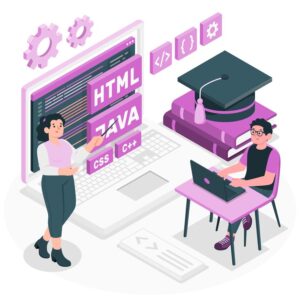Introduction
Online Courses for Coding has become an essential skill in today’s tech-driven world, and with the rise of online learning, mastering programming languages like Python, JavaScript, and others has never been easier. But why exactly is online learning so popular for coding? The convenience, flexibility, and vast selection of courses make it an attractive option for anyone looking to dive into the world of programming.
Whether you are a beginner looking to learn your first programming language or an experienced coder aiming to expand your skill set, online coding courses offer the perfect opportunity to learn at your own pace. Let’s explore everything you need to know about mastering coding languages through online courses.
What You Need to Know Before Choosing a Coding Course
Before you dive into the vast world of online coding courses, it’s essential to understand your learning goals. Are you learning to code for a career change, to enhance your current job skills, or just for fun? Knowing your goals will help you choose the right course and platform.
Additionally, evaluate your current skill level. Are you a complete beginner, or do you have some experience with coding? Different courses cater to different skill levels, so make sure to choose one that matches yours.
Top Online Platforms for Learning to Code
There are several popular platforms that offer a wide range of coding courses for various skill levels. Here are some of the best:
- Coursera: Offers courses from universities and institutions around the world, often providing certification.
- Udemy: Features a vast library of coding courses at different prices, often including lifetime access.
- Codecademy: Focuses on interactive coding exercises, ideal for hands-on learners.
- edX: Provides university-level courses and certificates from top universities like Harvard and MIT.
Each platform has its own strengths, so consider your learning preferences and budget when choosing the right one for you.
Master Python: The Beginner’s Favorite Language
Python is often the go-to language for beginners, and for a good reason. It is simple to learn, versatile, and widely used in various fields such as data science, web development, and automation.
Why Learn Python?
Python’s syntax is straightforward, making it an excellent choice for beginners. It’s also backed by a vast community and numerous libraries that make developing applications easier and faster.
Best Python Courses Online
Some of the top-rated Python courses include “Python for Everybody” on Coursera, “Complete Python Bootcamp” on Udemy, and Codecademy’s interactive Python path.
Key Topics Covered in Python Courses
Python courses typically cover topics like basic syntax, data types, loops, functions, object-oriented programming, and libraries such as NumPy and Pandas.
JavaScript: The Language of the Web
JavaScript is essential for web development, allowing you to create interactive websites and applications.
Importance of JavaScript in Web Development
JavaScript powers the dynamic aspects of websites and is crucial for front-end and back-end development. Mastering JavaScript opens up many opportunities in web development.
Top Online Courses for JavaScript
Look for courses like “The Complete JavaScript Course” on Udemy, “JavaScript for Web Developers” on Coursera, or Codecademy’s JavaScript track.
Core Concepts to Master in JavaScript
JavaScript courses typically cover fundamentals like variables, loops, functions, DOM manipulation, and modern frameworks like React and Angular.

Expanding Beyond: Other Popular Programming Languages
While Python and JavaScript are highly popular, other languages like Java, C++, and Ruby also offer exciting opportunities:
- Learning Java for Enterprise Development: Java is widely used in enterprise environments. Consider “Java Programming and Software Engineering Fundamentals” on Coursera.
- Introduction to C++ for Game Development: If game development interests you, learning C++ is a great choice. Check out “C++ for Programmers” on edX.
- Exploring Ruby for Web Frameworks: Ruby, particularly with the Ruby on Rails framework, is a favorite for web development. Courses like “The Complete Ruby on Rails Developer Course” on Udemy are great for beginners.
Choosing the Right Course Format
Not all Online Courses for Coding are created equal. You’ll find options like self-paced courses where you learn at your own speed, or instructor-led courses that provide more structure.
Self-Paced vs. Instructor-Led Courses
Self-paced courses allow flexibility, while instructor-led courses offer guidance and peer interaction. Choose based on your learning style and schedule.
Bootcamps vs. Regular Courses
Bootcamps are intensive, short-term programs designed to get you job-ready fast, whereas regular courses are more relaxed and spread over a longer duration.
Skills You’ll Gain from Online Coding Courses
By taking an online coding course, you’ll develop critical skills:
- Problem Solving and Logical Thinking: Coding challenges train your brain to think logically and solve problems efficiently.
- Real-World Project Experience: Many courses offer projects that simulate real-world scenarios.
- Certification and Career Advancement: Completing a course can lead to certifications that enhance your resume.
How to Stay Motivated While Learning to Code Online
Staying motivated is crucial when learning online. Set realistic goals, join a coding community for support, and use productivity tools like Pomodoro timers to manage your time effectively.
Best Practices for Succeeding in Online Coding Courses
To excel in your coding journey:
- Time Management Tips: Dedicate specific hours of the day to study and stick to them.
- Effective Note-Taking Techniques: Use digital tools like Evernote or Notion to organize your notes.
Free vs. Paid Online Coding Courses
Both free and paid courses have their perks. Free courses are excellent for those on a tight budget, while paid courses often provide more comprehensive content, better support, and certification.
How to Build a Career After Completing an Online Coding Course
Building a career after completing a coding course involves:
- Building a Portfolio: Showcase your projects on platforms like GitHub.
- Networking with Professionals: Attend coding meetups, webinars, and join coding forums.
- Applying for Internships and Entry-Level Jobs: Start applying as soon as you feel confident in your skills.
Success Stories: Individuals Who Mastered Coding Online
Many have successfully transitioned into tech careers through online learning. For example, Sarah, a former teacher, became a software engineer after completing a coding bootcamp online.

Conclusion
Online Courses for Coding provide a flexible and effective way to learn programming languages like Python, JavaScript, and more. With the right course and a commitment to learning, you can build valuable skills and advance your career in tech.
